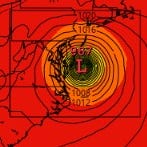Thomas Jefferson..A Meteorologist?
A short evaluation of Thomas Jefferson dabbling into Meteorology
“My method is to make two observations a day, the one as early as possible in the morning, the other from 3. to 4. clock, because I have found 4. clock the hottest and daylight the coldest point of the 24. hours. I state them in an ivory pocketbook in the following form and copy them out once a week. The 1st. column is the day of the month. The 2d. the thermometer in the morning. The 4th do. in the evening. The 3d. the weather in the morning. The 5th do. in the afternoon. The 6th is for miscellanies, such as the appearance of birds, leafing and flowering of trees, frosts remarkably late or early, Aurora borealis, &c. In the 3rd. and 5th. columns, a. is after c, cloudy: f, fair: h, hail: r, rain: s, snow. Thus c a r h s means, cloudy after rain, hail, and snow. Whenever it has rained, hailed, or snowed between two observations I note it thus, f an r (i.e. fair after rain) c an s (cloudy after snow &c.) otherwise the falling weather would escape notation. I distinguish weather into fair or cloudy, according as the sky is more or less than half covered with clouds."[1]
Thomas Jefferson wrote this in his daily weather observations with his daily recordkeeping in his weather journal. And, on July 4th, 1776, Jefferson wrote that it was 76 degrees F and a slight wind coming in from the North.
So, it seems Jefferson “dabbled” into the science of Meteorology while doing other things like going to Paris, going back to Monticello, etc… Jefferson thought that after studying an extensive amount of Science, meteorology hadn’t received much attention. His data gathering was part of his way of contributing to that science portion. He encouraged Lewis and Clark to write down extensive weather/climate information on their journey across the Louisiana Purchase. He experimented with hydrometers and thermometers
s because he believed there weren’t enough instruments that could measure the things Jefferson wanted to measure like wind, humidity, etc…
I have to say that Thomas Jefferson was a pretty good “meteorologist”!



